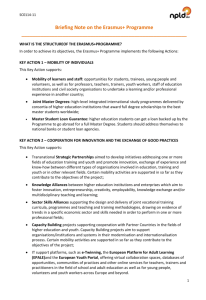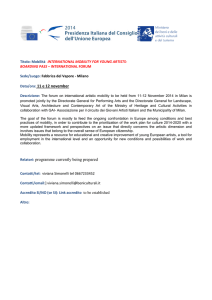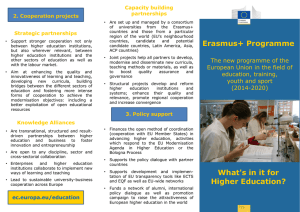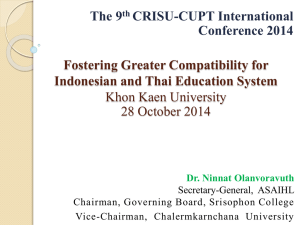i. proposed mobility programme
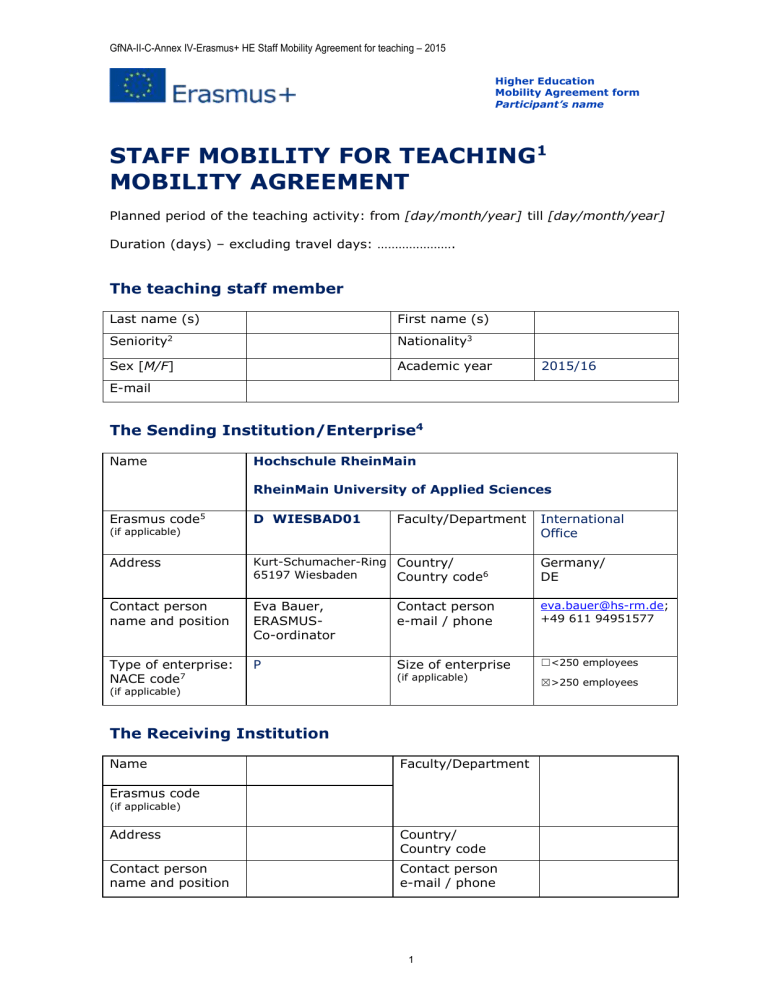
GfNA-II-C-Annex IV-Erasmus+ HE Staff Mobility Agreement for teaching – 2015
Higher Education
Mobility Agreement form
Participant’s name
STAFF MOBILITY FOR TEACHING
1
MOBILITY AGREEMENT
Planned period of the teaching activity: from [day/month/year] till [day/month/year]
Duration (days) – excluding travel days: ………………….
The teaching staff member
Last name (s)
Seniority 2
First name (s)
Nationality 3
Sex [M/F]
Academic year
The Sending Institution/Enterprise
4
Name Hochschule RheinMain
RheinMain University of Applied Sciences
2015/16
Erasmus code 5
(if applicable)
Address
Contact person name and position
D WIESBAD01
Kurt-Schumacher-Ring 18
65197 Wiesbaden Country code 6
Eva Bauer,
ERASMUS-
Co-ordinator
Faculty/Department International
Office
Contact person e-mail / phone
Germany/
DE eva.bauer@hs-rm.de
+49 611 94951577
;
Size of enterprise
(if applicable)
☐ <250 employees
☒ >250 employees
Type of enterprise:
NACE code 7
(if applicable)
P
The Receiving Institution
Name Faculty/Department
Erasmus code
(if applicable)
Address
Contact person name and position
Country/
Country code
Contact person e-mail / phone
1
GfNA-II-C-Annex IV-Erasmus+ HE Staff Mobility Agreement for teaching – 2015
For guidelines, please look at the end notes on page 3.
Higher Education
Mobility Agreement form
Participant’s name
2
GfNA-II-C-Annex IV-Erasmus+ HE Staff Mobility Agreement for teaching – 2015
Higher Education
Mobility Agreement form
Participant’s name
Section to be completed BEFORE THE MOBILITY
I. PROPOSED MOBILITY PROGRAMME
Main subject field 8 : ………………….
Level (select the main one): Short cycle (EQF level 5) ☐ ; Bachelor or equivalent first cycle (EQF level 6) ☐ ; Master or equivalent second cycle (EQF level 7) ☐ ; Doctoral or equivalent third cycle (EQF level 8) ☐
Number of students at the receiving institution benefiting from the teaching programme: ………………
Number of teaching hours: …………………
Language of instruction: ………………………………………
Overall objectives of the mobility:
Bitte ergänzen!
Added value of the mobility (in the context of the modernisation and
internationalisation strategies of the institutions involved):
RheinMain University of Applied Sciences considers internationalisation a requirement in providing high-quality education and high-quality teaching. For this purpose, all university staff members are provided opportunities to acquire international experience. Teaching staff mobility allows instructors to gain intercultural experience abroad and to improve language skills. It fosters a sense of
European citizenship and mutual understanding which has altogether a positive effect on the welcoming culture at RheinMain University.
Ggf. Ergänzen!
Content of the teaching programme:
Bitte ergänzen! Inhalt des Kurses
Expected outcomes and impact (e.g. on the professional development of the teaching staff member and on the competences of students at both institutions):
Teaching staff mobility provides less mobile students and staff at the host organisation opportunities for international and intercultural experience
3
GfNA-II-C-Annex IV-Erasmus+ HE Staff Mobility Agreement for teaching – 2015
Higher Education
Mobility Agreement form
Participant’s name
(internationalisation at home). The quality of education programmes at the host organisation is greatly increased through the internationalisation of teaching. The teaching staff member improves intercultural competencies and language skills which has not only a positive effect on the welcoming culture at RheinMain
University but also on the students of RheinMain University who make a profit from the new gained impressions and professional input of the teaching staff.
Cooperation between sending and receiving institution will be intensified. Student exchange shall be increased or initiated.
Ggf. Ergänzen!
II. COMMITMENT OF THE THREE PARTIES
By signing 9 this document, the teaching staff member, the sending institution/enterprise and the receiving institution confirm that they approve the proposed mobility agreement.
The sending higher education institution supports the staff mobility as part of its modernisation and internationalisation strategy and will recognise it as a component in any evaluation or assessment of the teaching staff member.
The teaching staff member will share his/her experience, in particular its impact on his/her professional development and on the sending higher education institution, as a source of inspiration to others.
The teaching staff member and the sending institution commit to the requirements set out in the grant agreement signed between them.
The teaching staff member and the receiving institution will communicate to the sending institution/enterprise any problems or changes regarding the proposed mobility programme or mobility period.
The teaching staff member
Name:
Signature:
The sending institution/enterprise
Name of the responsible person: Eva Bauer
Signature:
The receiving institution
Name of the responsible person:
Signature:
Date:
Date:
Date:
1 In case the mobility combines teaching and training activities, this template should be used and adjusted to fit both activity types.
2
Seniority: Junior (approx. < 10 years of experience), Intermediate (approx. > 10 and < 20 years of experience) or Senior (approx. > 20 years of experience).
3
Nationality: Country to which the person belongs administratively and that issues the ID card and/or passport.
4
GfNA-II-C-Annex IV-Erasmus+ HE Staff Mobility Agreement for teaching – 2015
Higher Education
Mobility Agreement form
Participant’s name
4
All refererences to "enterprise" are only applicable to mobility for staff between Programme Countries or within Capacity Building projects.
5 Erasmus Code: A unique identifier that every higher education institution that has been awarded with the
Erasmus Charter for Higher Education receives. It is only applicable to higher education institutions located in Programme Countries.
6 Country code: ISO 3166-2 country codes available at: https://www.iso.org/obp/ui/#search .
7 The top-level NACE sector codes are available at http://ec.europa.eu/eurostat/ramon/nomenclatures/index.cfm?TargetUrl=LST_NOM_DTL&StrNom=NACE_R
EV2&StrLanguageCode=EN
8 T he ISCED-F 2013 search tool (available at http://ec.europa.eu/education/tools/isced-f_en.htm) should be used to find the ISCED 2013 detailed field of education and training.
9 Circulating papers with original signatures is not compulsory. Scanned copies of signatures or electronic signatures may be accepted, depending on the national legislation of the country of the sending institution
(in the case of mobility with Partner Countries: the national legislation of the Programme Country).
5
